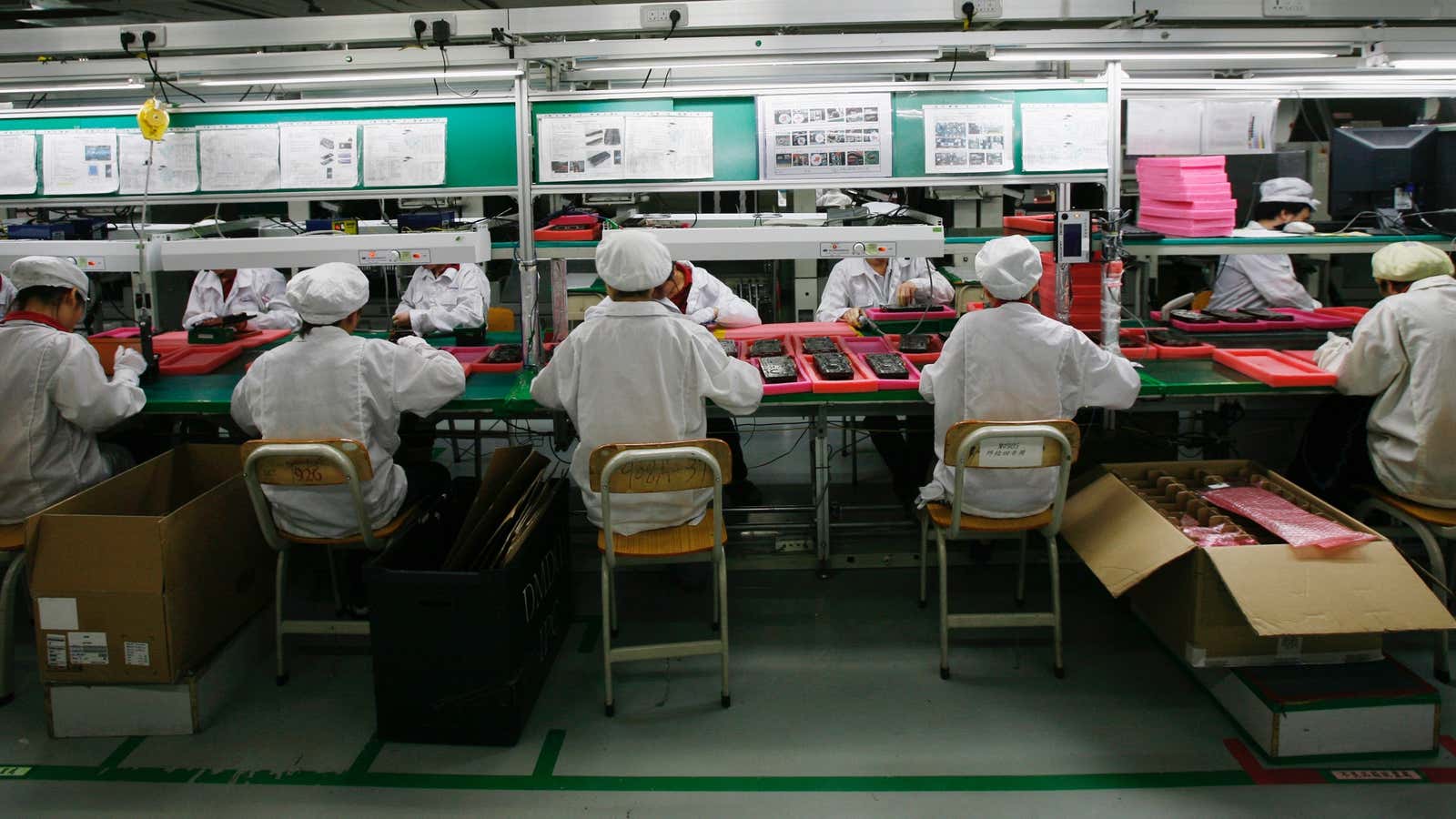Rival Foxconn’s horror stories and its own controversial past should have been a wake up call for Pegatron, the Taiwanese electronics company manufacturing the iPhone 7.
Instead, a recent report finds, workers in Pegatron’s Shanghai factory have been excessively overworked over the past year. Pegatron’s Shanghai workers—up to 100,000 of them during the peak season—were forced to work “excessive and illegal overtime” according to China Labor Watch. In the past year, the average worker racked up 80 hours of overtime a month. Over 62% of workers worked more than 100 overtime hours in March 2016. One worker worked 109 overtime hours, the New York-based non-profit writes, which works out to over 67 hours a week.
Apple stipulates that workers should have at least one day off a week and work no more than 60 hours. Apple didn’t respond to a request for comment.
Aside from the documented excessive overtime, workers may be toiling even more time they aren’t being paid for. CLW interviewed about a hundred workers and learned that managers require production line workers to report to work 10 unpaid minutes before their start times to punch in to work. If you tally up the 10 minutes it takes every time the workers go to or leave work, even for lunch or dinner, almost an hour a day is wasted.
Interns making Apple products are being overworked as well. Supplier Foxconn admitted to violating a ban on intern overtime three years ago. This report shows Pegatron, too, overworked the majority of its maintenance department interns—64% of them to be precise.
Making matters worse, workers are powerless to escape the grind. Of the ten times undercover investigators and other worker volunteers asked to not work overtime, they were only approved twice. Getting leave involved impenetrable red tape: Team leaders deferred workers to senior leaders, who then sent them to department heads, who sent them onward to the manager. “In the end, they did not receive approval,” the report states. “They subsequently filed a complaint to the workers’ service center, which was rejected. Workers were told to cooperate with the factory’s arrangement.”
Pegatron workers are also underpaid, at least when compared to the city average. In 2015, the average wage in Shanghai was 5939 yuan ($895) per month, according to Xinhua News, the government’s press agency. “In comparison, Pegatron workers, who had put in as many as 90 overtime hours [a month] during peak production season, only received about $633 USD each month,” the report states. During off-season months, workers reportedly earned almost half of Shanghai’s average wage. Over 96% of the Pegatron workers were barely making minimum wage.
Toshiba and Microsoft have given less business to the Taiwanese company amidst slumping sales, and Pegatron is expected to go to great lengths to keep Apple, its biggest client, while Apple pushes suppliers to cut costs as iPhone demand weakens. CLW writes that “through outsourcing, Apple lowers its production cost, but this is only possible by exploiting workers. Apple is the real reason working conditions are deteriorating.” Quartz’s Adam Pasick explains:
Assembling devices for Apple has always been a cyclical, low-margin business, albeit one that was highly desirable when the Steve Jobs-led firm could do no wrong, and its revolutionary products were sure-fire hits. Now that the rest of the world is catching up to Apple on tablets and Google’s Android platform has surpassed the iPhone, there are dangerous new uncertainties for business models with barely any room for error.
Conditions at Apple’s other major manufacturer, Foxconn, have historically been poor, with underage children making products in the factories, and multiple suicides reported. Go get more robots, Apple. Humans don’t deserve this.




